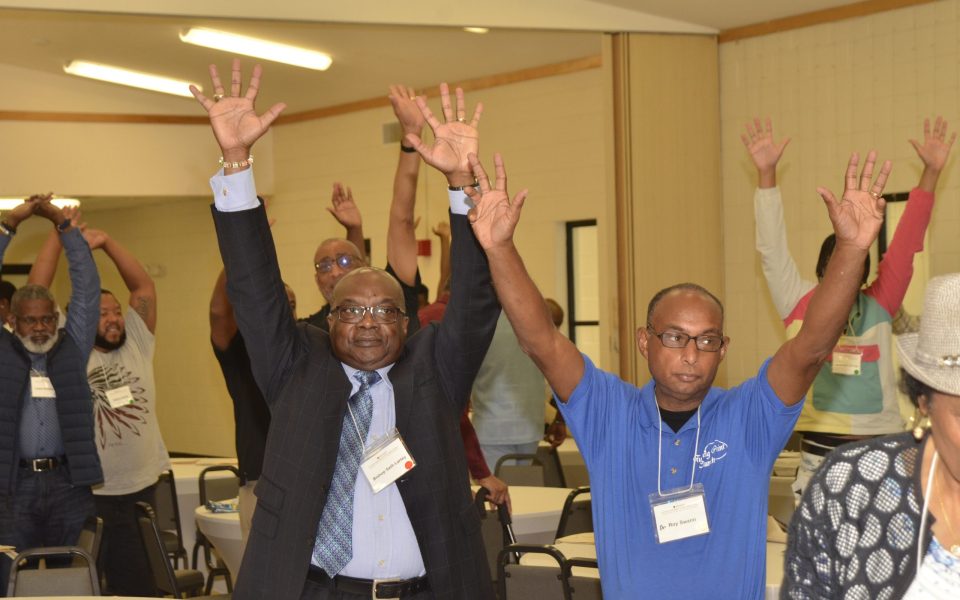Featured photo: Attendees pose during the third annual Black Men’s Health and Wellness Symposium in Winston-Salem on Sept. 21. (photo by Gaither Photography)
“We need to make a change. We need to look at ourselves, look at each other, and help each other,” says physician assistant and professor Robert Wooten during the third annual Black Men’s Health and Wellness Symposium in Winston-Salem on Sept. 21. “If you could look out for the brother next to you, walk with them along their health journey, it makes it a lot easier.”
Fellowship and resources are one of the things the symposium aims to provide, says Shawnta Lloyd, Community Health Alliance for Men’s Health Promotion (CHAMP) project lead. According to Lloyd, the event, which was hosted at St. Stephens Missionary Baptist Church, helps Black men in the area who are concerned about their health connect with Black male physicians and other healthcare professionals.
The symposium was also hosted to bring Black men into the conversation and provide a space where they can express their needs, adds Lloyd.

Unlike the previous two years the symposium was held, this event included community listening sessions led by Black men that were held in different rooms down a corridor of the large church.
“The goal is really to create a health space just for Black men and give them more empowerment around their health,” Lloyd says.
The symposium comes at a time when health outcomes for Black men are declining.
According to the Centers for Disease Control and Prevention, Black males had the fourth largest decrease in life expectancy between 2019 and 2021, declining 3.7 years on average. American Indian and Alaska Native men and women, and Hispanic men, had the third largest decreases in life expectancy.
To alleviate the national issue, the organization plans on using the information gathered from the sessions to create a strategic plan by next year, Lloyd says. It’s always important to get community opinions about their concerns, says CHAMP co-project lead Goldie Byrd.
“It’s one thing for us to design programs, research, and resources. It’s another thing to get what the community really feels,” Byrd added.

The men who attended the symposium will be invited back for another listening session after the strategic plan is completed, according to Byrd. This will give them a chance to see what was developed and give additional feedback on the plan. The participants will also be compensated for the listening sessions they participate in.
Part of the conversation that took place at the symposium was the acknowledgement of the historical mistreatment of Black men in medical settings. Having those difficult conversations can lead to healing, says licensed clinical social worker Jaren Doby. One example referenced during a panel discussion was the Tuskegee Experiments.
The study, officially titled “Tuskegee Study of Untreated Syphilis in the Negro Male,” took place for 40 years from 1932 to 1972 in Macon County, Ala.; it was funded by US Public Health Service (PHS) and the CDC.
The purpose of the study, according to the white doctors, was to observe the effects of syphilis on patients when untreated. In return, the men were told they would receive free medical care But that’s not what happened.
By the end of the study, more than 100 men died and more had infected their wives and children with syphilis. That was because the men who participated were not informed of their syphilis diagnosis or the length of the study. Even after penicillin became the standard of treatment in 1947, none of the men were actually treated.
Decades later, those wounds created by systemic health racism can be longlasting in communities of color. That’s why encouraging Black men to ask for medical treatment is important, according to Doby.
“You don’t have to show this perceived sign of strength by enduring your trauma and pushing through life,” Doby says. “That’s a remedy for disaster. It’s like pressure building in pipes.”
The group hopes to engage more young people with the symposium going forward, says Rev. Pamela Phillips, who is a member of the Triad Pastors Network (TPN), a collaboration between North Carolina religious leaders and the Maya Angelou Center for Health Equity at Wake Forest University School of Medicine.
Pastors have an intimate relationship with the community which allows them to guide young men to take care of their health, she explains. Providing health clinics, screenings, and resources will be key, adds Phillips.
Xavier Chancellor, 26, a student at North Carolina A&T University said that coming to the symposium made him feel “relieved.” And that’s the goal, Doby says.
The time is ripe for healing the medical trauma that many Black men struggle with, says Doby.
“The good thing about it is the change is not coming, it’s here,” Doby says. “Ten years ago this wasn’t happening very often, but we’re seeing change and I’m thankful for that.”
Join the First Amendment Society, a membership that goes directly to funding TCB‘s newsroom.
We believe that reporting can save the world.
The TCB First Amendment Society recognizes the vital role of a free, unfettered press with a bundling of local experiences designed to build community, and unique engagements with our newsroom that will help you understand, and shape, local journalism’s critical role in uplifting the people in our cities.
All revenue goes directly into the newsroom as reporters’ salaries and freelance commissions.


Leave a Reply